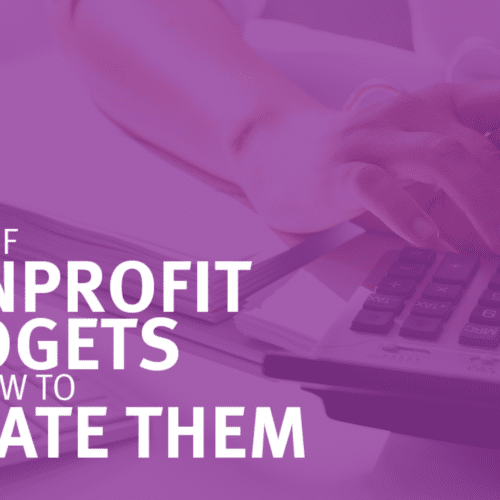Guest post written by Dr. Stephen Urich, CEO of Labyrinth, Inc.
Quickly pivoting your strategies and messaging in 2020 was no easy feat, but many nonprofits have been able to reach and even exceed their fundraising goals over the past year. Now, it’s time to look ahead towards what your nonprofit can accomplish in 2021 and beyond.
For many organizations, it’s time to take their fundraising efforts up a notch. Maybe you’ve got new programming that needs funding or perhaps you are developing a capital campaign to meet increased need in your community. Whatever your exact situation, you’ll almost certainly be fundraising across state lines.
But while your nonprofit’s team is excited about the new programs, fundraising campaigns, and outreach efforts that you’ll roll out, there’s one aspect of multi-state fundraising that can be easy to inadvertently neglect—compliance. The logistical and regulatory necessities that come with fundraising and operating a nonprofit don’t stop after you’ve received your 501(c)(3) status and regularly submit your annual Form 990.
If your organization has (or is preparing to) expand its fundraising operations to multiple states, you’ll have some additional regulatory considerations to keep in mind. At Labyrinth, we’ve helped nonprofits of all sizes navigate the compliance landscape for over 30 years, so we wanted to share a few essentials you’ll need to keep in mind as your organization grows past state lines:
-
Registering to Solicit Donations
-
Corporate Requirements and Registered Agents
-
Varied Financial Reporting Requirements
-
Digital Communication and Privacy Concerns
-
Seeking Outside Support
Nonprofit compliance is certainly complex—requirements can vary greatly from state to state and change frequently. However, you can’t afford to let these concerns fall by the wayside during your multi-state push. We recommend familiarizing yourself with these essentials and building them into your big-picture campaign plans from the very start. Let’s dive in.
1. Registering to Solicit Donations
Nonprofits are required to register with state governments in order to solicit donations from their residents. Your nonprofit (hopefully!) has already registered to fundraise in its home state, but you’ll be required to register in most other states that you begin actively fundraising in.
The actual solicitation registration process is fairly straightforward: You determine the exact requirements in each state where you plan to fundraise, prepare the necessary documentation, submit it, and then keep up with renewal deadlines going forward.
In practice, however, registering to fundraise in multiple states can easily become confusing. The exact documentation requirements and deadlines can vary greatly between jurisdictions, making it tricky to keep the entire process organized if you’re filing in multiple states at once. You may be required to submit a mix of these documents in addition to your registration form:
-
Your most recent IRS Form 990
-
Your nonprofit’s bylaws and articles of incorporation
-
Your IRS Letter of Determination
-
Lists of your officers, directors, and trustees
-
Any additional state forms specified by the jurisdiction
-
Audited or reviewed financial statements
-
Copies of your contracts with fundraising consultants or outside counsel
-
Copies of any commercial co-venture agreements with businesses
Currently, 41 states and the District of Columbia require solicitation registration before you can begin fundraising from their residents. You may also be required to publish disclosure statements once your registration is approved.
The bottom line is that exact registration requirements vary from state to state, so it’s your responsibility to understand the exact processes that you’ll need to follow. Explore Labyrinth’s guide to solicitation registration for a full breakdown of the process and further explanations of the materials listed above.
Important Note: Don’t forget about online fundraising! Amid the shift to virtual-first events and campaigns, nonprofits have extended their reach further than ever, making this aspect of registration compliance even more vital.
If you receive online donations from residents of any state, you’re generally required to be registered to fundraise there. Your safest choices are to register in all states (which isn’t always feasible for smaller organizations), register in the most populous states, and/or to disclose which states you’re able to accept donations from on your online fundraising pages.
2. Corporate Requirements and Registered Agents
Along with registering to fundraise, your organization is also required to register to conduct business in some states through their Attorney General or Secretary of State office. These states include:
-
The state where your nonprofit is already incorporated
-
States where your nonprofit has paid staff
-
North Dakota and the District of Columbia, if you’re also registered to fundraise in those jurisdictions
Additionally, you’ll be required to appoint and name your nonprofit’s registered agents in those jurisdictions. A registered agent is a person who resides or works in a state where you conduct business, and they serve as your organization’s representative there, receiving legal and tax documents on your behalf. They may or may not be a paid staff member of your nonprofit.
For organizations with on-the-ground operations in multiple states, you might appoint a paid staff member to serve as your registered agent. In other situations, or to take all of the guesswork out of the process, you can partner with a registered agent service. These services provide your organization with dependable representation from an individual registered agent. And as you file for registration in relevant states and renew your filings on a regular basis, remember that you’ll need to keep your listed address and registered agent up to date.
Although not directly related to fundraising, corporate registration is still extremely important for your multi-state operations. Failure to file or to renew can result in your nonprofit losing its good standing with state governments, harming your reputation and making operating there legally challenging.
3. Varied Financial Reporting Requirements
As mentioned above in the charitable solicitation registration process, you’ll need to provide state agencies with transparency into your nonprofit’s financial activities in order to start and keep fundraising in those jurisdictions.
For many states, this involves submitting your latest Form 990 with your initial registration and subsequent renewals.
However, nonprofit state filing requirements can vary when it comes to financial reporting, so research exactly what you’ll need to submit to remain compliant in different jurisdictions. If a state has additional specific requirements for financial reporting beyond just the Form 990, you’ll likely need to work with a nonprofit CPA to produce reviewed or audited financial statements.
Understanding these additional requirements will help ensure you’re always ready to meet renewal deadlines with the appropriate documentation. Especially when you’re managing multiple state registrations, having everything ready to go in advance is extremely helpful. Plus, it helps you avoid costly late fees and the complications of rejected filings.
4. Digital Communication and Privacy Concerns
In the digital age, regulations around online communication and privacy are becoming increasingly important for nonprofits. If you’re actively fundraising in multiple states and using email or other digital means to reach residents of those states, you’ll need to understand the regulatory landscape.
There are three main pieces of legislation that will likely impact your email marketing strategies and other online fundraising tactics:
-
The CAN-SPAM Act. This 2003 US law essentially states that you need supporters’ express or implied permission to send them emails—you can’t send them messages and appeals just because you have their email address. To stay compliant, only send emails to supporters who specifically sign up for them or who opt-into receiving them (by completing a transaction in which you clearly state that you may reach out in the future). Additionally, you’ll need to provide an opt-out option on all of your emails.
-
The GDPR. The EU’s General Data Protection Regulations are sweeping rules that affect how organizations worldwide can collect and use the data of EU citizens. Your multi-state fundraising efforts may reach European citizens, so err on the side of safety by ensuring compliance on both your website and emails.
-
The California Consumer Privacy Act. Similar to the GDPR, this California-specific law regulates how organizations can collect and use the personal data of Californians. If your multi-state fundraising will extend to California (or simply might reach California residents online), study up to ensure your own strategies and those of any third-party data vendors or consultants are compliant.
Digital compliance is complex, and it’s a constantly evolving landscape. For nonprofits, there are two main takeaways to keep in mind:
-
Always consider the extent to which supporters have given you permission to contact them before sending messages.
-
Do your due diligence by vetting all third-party vendors you may work with to ensure that they’re compliant with all data privacy laws.
Working with a nonprofit attorney or tech consultant well-versed in this field may be your best choice if you’re unsure of exactly how data regulations affect your fundraising strategies. For long-term compliance and to create a more informed culture at your nonprofit, you might even look into purchasing or developing eLearning resources for your team to help them understand the compliance ramifications of your online strategies.
5. Seeking Outside Support
Finally, while expanding their fundraising reach through large-scale, multi-state campaigns, many nonprofits will choose to work with fundraising consultants or other outside fundraising counsel. This can be an excellent way to give your efforts the structure and support, but it does bring along some additional compliance considerations.
Any fundraising consultants, counsel, solicitors, or commercial co-venturers who you engage themselves need to be registered in the various states where they work. Both your nonprofit and your counsel must be compliant in the jurisdictions where you’ll be working together.
Double-checking their compliance is part of your nonprofit’s due diligence. Each state defines these “paid fundraising contractors” in different ways, so do your research beforehand to understand what to look for as you vet potential partners. In many states, you’ll also need to provide copies of contracts with these professionals to register or renew your solicitation filings.
But beyond fundraising consulting, your nonprofit may want extra help simply navigating the regulatory complexities of multi-state fundraising. There are professionals who can help with this, too. These types of partners can help your organization stay compliant without feeling overwhelmed:
-
Nonprofit compliance services
-
Certified accountants experienced with nonprofit financial needs
-
Attorneys specialized in nonprofit law
-
Nonprofit tech consultants who understand digital compliance regulations
There are experts and nonprofit consultants who specialize in practically any aspect of your operations. If you decide your nonprofit needs outside support, start by clearly defining your needs and looking for partners with long-standing, proven track records in their area of expertise.
As your nonprofit gears up for multi-state campaigns and expansions, there’s always the risk of letting compliance fall by the wayside as you juggle a variety of new demands. After all, state-level regulations are extremely diverse and downright complicated. You’ve worked hard to expand your nonprofit’s mission nationwide—safeguard all that hard work by researching and understanding any new requirements that you’ll be held to.
Risking non-compliance is never worth it, but attempting to handle it all on your own (even with the most organized internal processes) can quickly drain your team’s time. Partnering with compliance experts is often nonprofits’ best bet. It allows you to keep the focus on fundraising and serving constituents, not on paperwork. Good luck, and happy fundraising!
About Dr. Urich
Dr. Stephen Urich is the CEO of Labyrinth, Inc., an organization that assists charitable organizations with all aspects of charity state registration and compliance. He is also a Certified Public Accountant and specializes in nonprofit accounting. He has been working in the nonprofit sector for 25 years.






